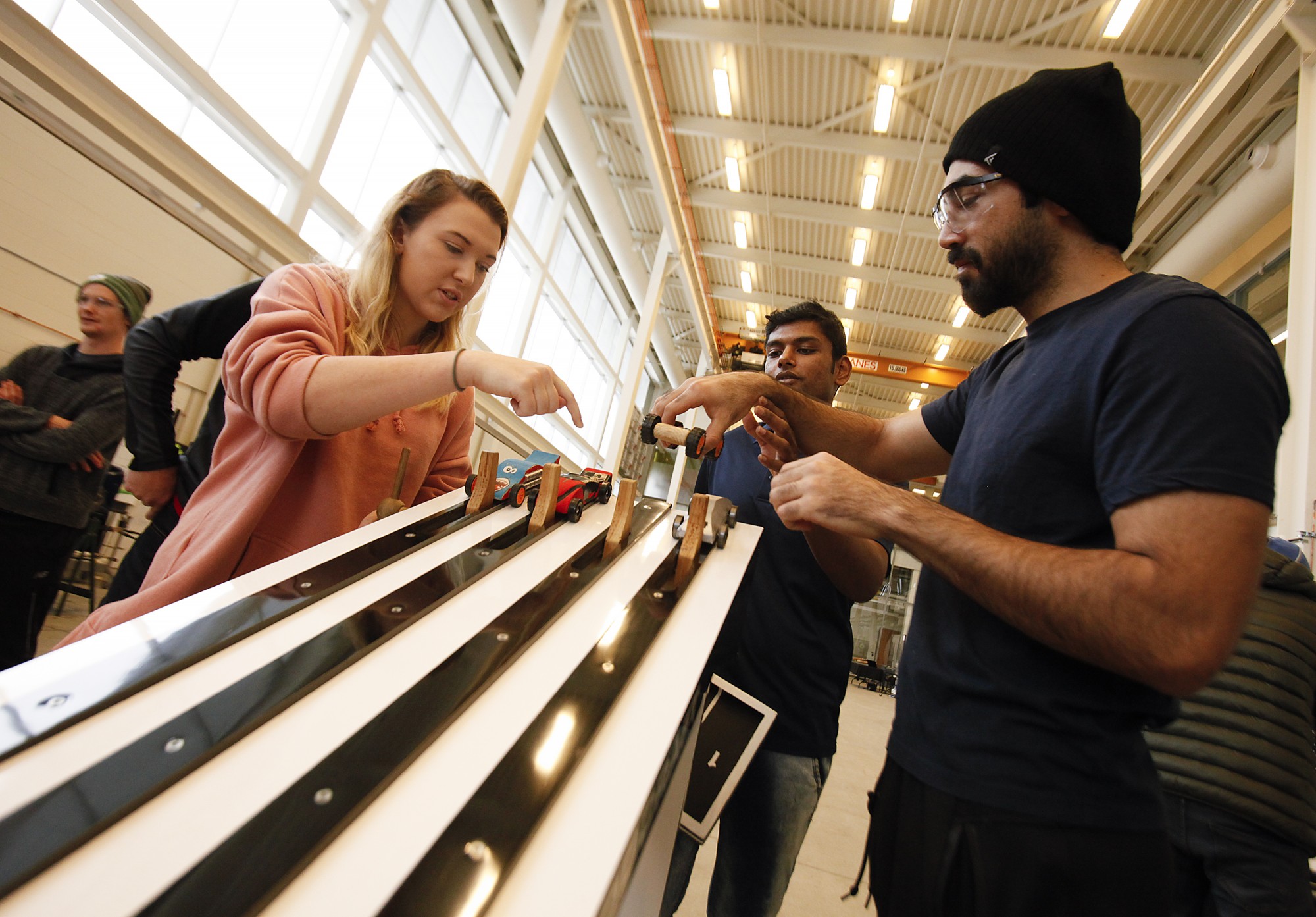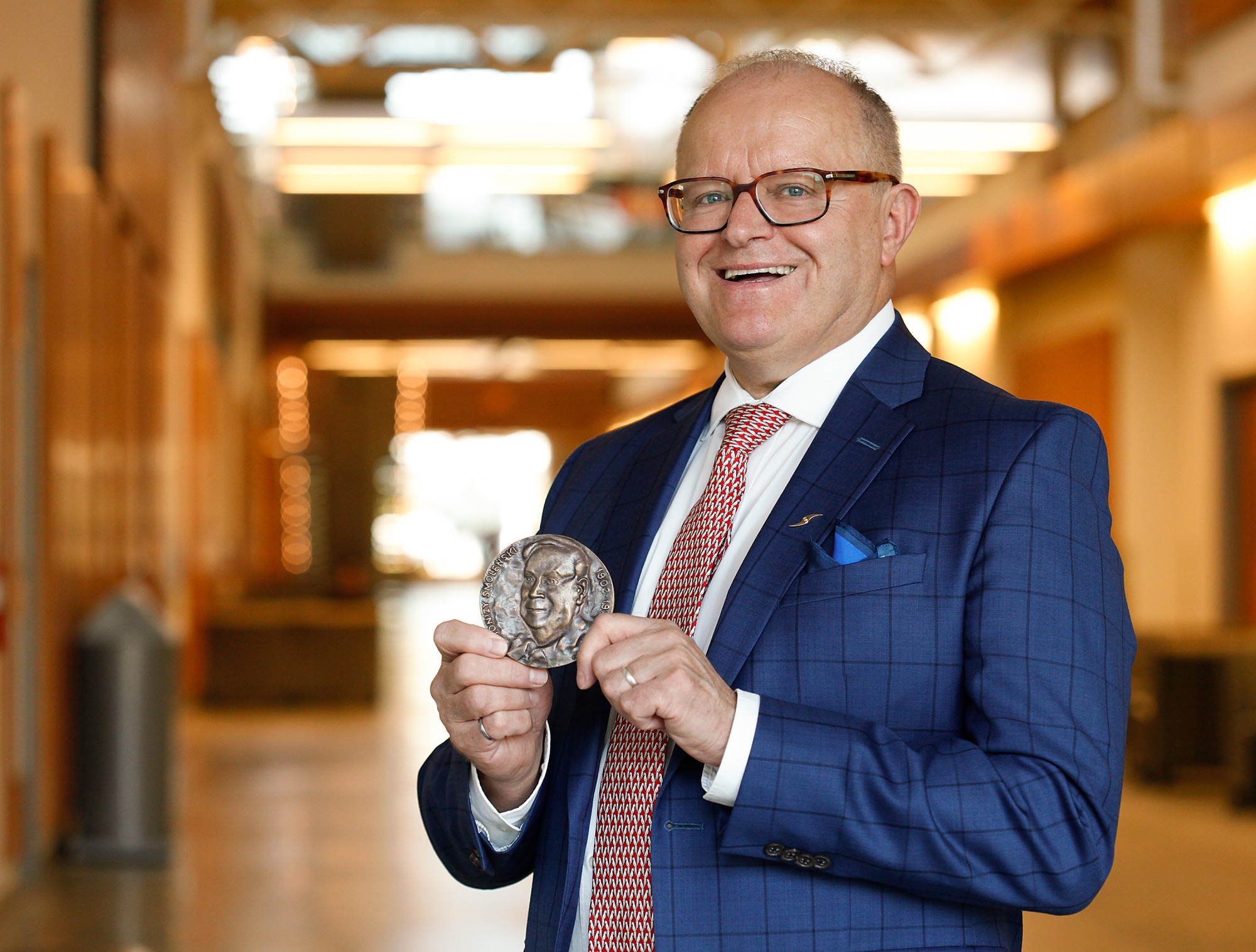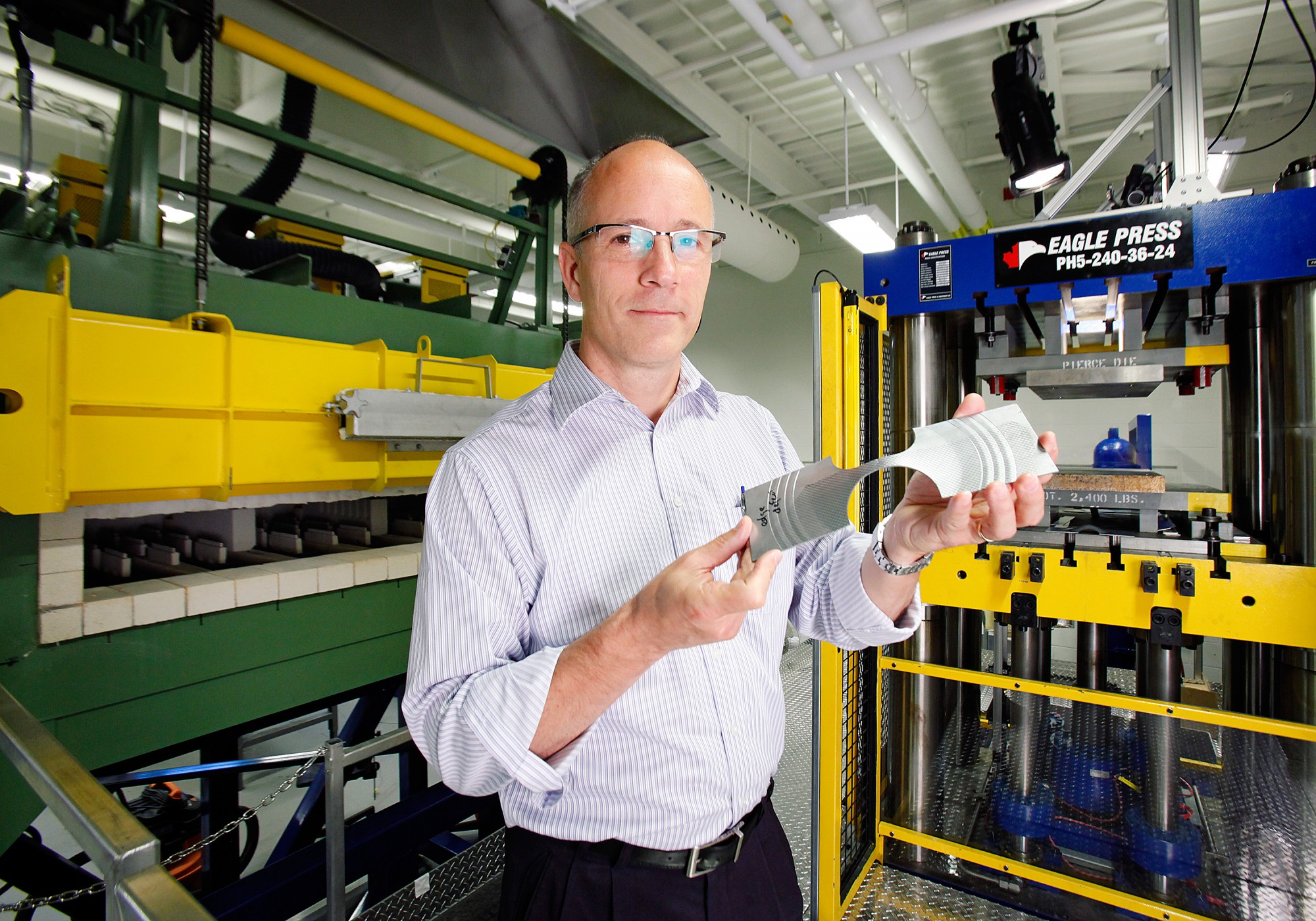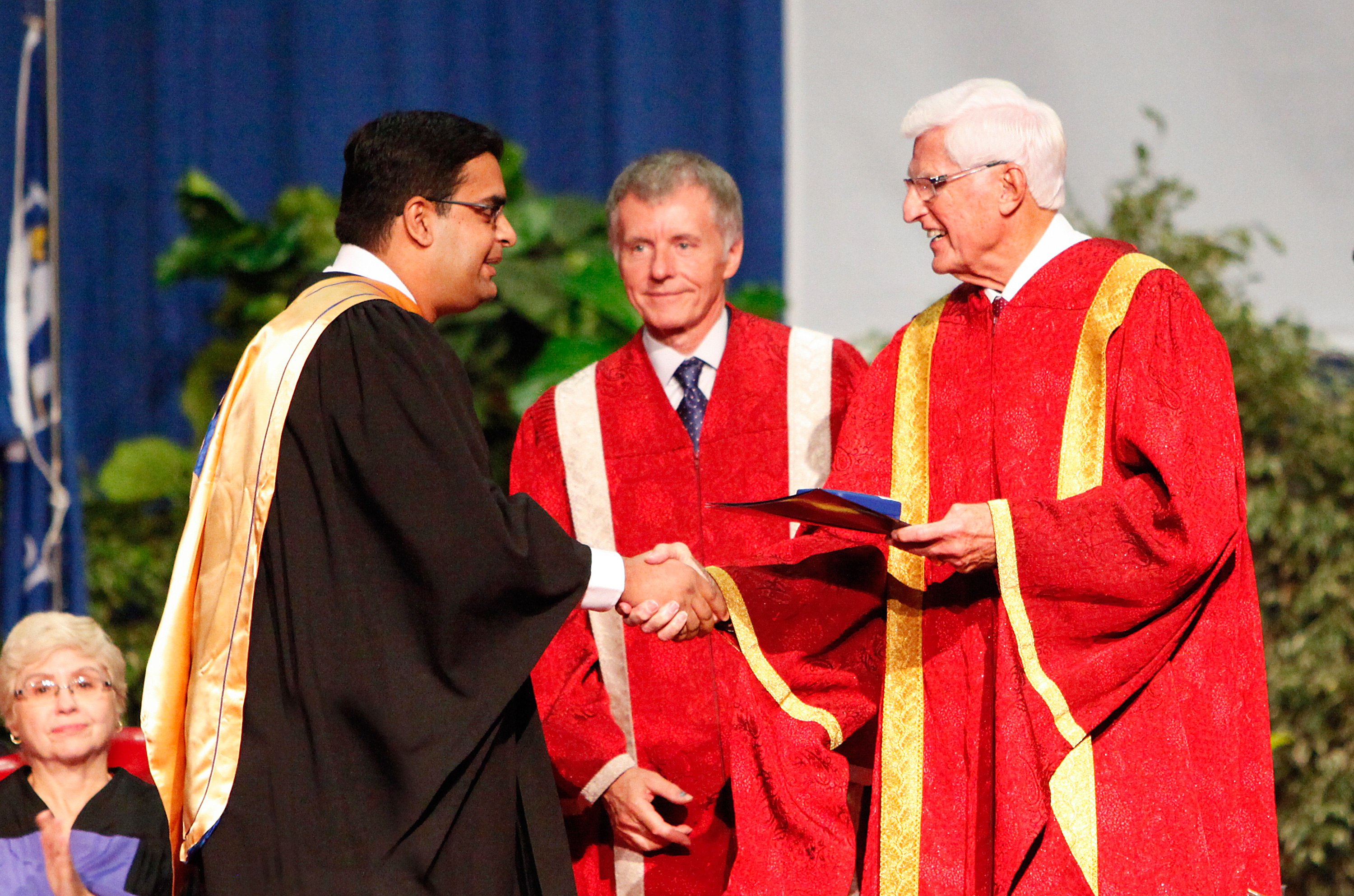
A project to design and build hydraulic robotic arms powered by syringes taught a class of engineering students about the challenges of the profession.
Teams demonstrated their creations for the third-year course “Manufacturing Process Design,” Thursday in the Centre for Engineering Innovation. Each project had to incorporate several joints and be able to grasp and lift an object, operated by rubber-piston needle syringes.
Designs incorporated wood and metal, dowels and glue, 3D-printed and molded plastics, employing fluids as different as oil and water to operate crab-like claws.
— Published on Dec 8th, 2017
 A design competition for electrical engineering students brought their learning out of textbooks and into reality last week.
A design competition for electrical engineering students brought their learning out of textbooks and into reality last week.
“It was interesting to apply the theory we learned in class to predict circuit behaviour and help troubleshoot,” said Emilie Bondy, whose team took home first place for designing a Multiple Option Input Responsive Beverage Mixer.
Bondy and her teammates, Muntasir Alam and Tristen Michaud-Laughton, received $180 in UWindsor Campus Bookstore gift certificates.
More than 100 electrical engineering students from professor Mitra Mirhassani’s third-year class, “Electronics II,” competed. As part of a course requirement, students were tasked with designing a product under a $30 budget using an analog circuit and various signal processors.
— Published on Dec 7th, 2017

Dylan Verburg grew up on a farm, and his experience with small construction projects there has proven invaluable in his current challenge — deploying equipment in a drainage pond outside the Indian capital of New Delhi in an attempt to improve water quality.
“Two 50-foot sections of tubing were placed … with the intention of oxidizing the inlet stream before it mixes with the main body of the lake,” the civil engineering student writes in a blog on the Windsor Engineering website. “Six additional lines are placed strategically in the main body of the lake,” located along the Yamuna River in North Delhi.
He will measure the resulting changes, which aim to aerate the water, allowing beneficial bacteria to flourish and naturally restore the ecosystem.
— Published on Jun 8th, 2018

M.Eng student Bhavesh Lakhankiya completed an internship at Diageo Canada Inc. in Amherstburg, Ont..
— Published on Jan 4th, 2018

Mechanical engineering students took a break from their books Friday to compete against their peers in a gravity car competition. More than 50 students took part in the friendly competition hosted for the first time by the university’s Master of Engineering Auto Student Advisory Council.
“This competition is an opportunity for students to showcase their design skills and their knowledge of fundamental engineering concepts such as aerodynamics,” said Tracy Beemer, program administrator for the MEng Automotive program.
— Published on Jan 7th, 2021

The head of the UWindsor Department of Mechanical, Automotive and Materials Engineering has been recognized by the Polish Academy of Sciences for his outstanding contributions towards advances in the knowledge of combustion process and technologies.
Andrzej Sobiesiak received the Dionizy Smoleński Medal September 5, during a joint meeting of the Polish Section of the Combustion Institute and XXIII International Symposium on Combustion Processes in Rynia near Warsaw, Poland after delivering a keynote lecture on “Internal Combustion Engines Fuelled with Solutions of Liquid and Gaseous Fuels.”
At the award ceremony, Dr. Sobiesiak was cited for his research on droplets combustion in microgravity, development and work on flameless combustion and ultra-low NOx burner, Homogeneous Charge Compression Ignition (HCCI) engines charged with fuels derived from biomass and unique split-cycle engine fuelled with natural gas.
— Published on Jan 7th, 2021

An injection of nearly $2 million in federal funds will aid University of Windsor researchers like Daniel Green, who is helping automakers incorporate lightweight sheet materials into their vehicles.
The automotive sector is turning to lightweight materials as an alternative to steel to improve fuel efficiency. However, lower-density metals tend to have limited formability, says Dr. Green, an associate professor who specializes in materials engineering.
“Innovative forming processes need to be developed and optimized for the production of automotive parts,” he said. “With high-speed forming, we can get 100 per cent more formability than we can with conventional stamping.”
Green is one of 14 UWindsor engineering professors who was awarded funding through the 2017 Discovery Grants Program — an annual competition run by the Natural Sciences and Engineering Research Council of Canada (NSERC) to advance research in Canadian universities.
— Published on Jan 7th, 2021

An engineering graduate was honoured for his outstanding academic achievement this past weekend during the 108th Convocation ceremonies held in the St. Denis Centre.
Lakshmi Varaha Iyer, who received a PhD in Electrical Engineering in 2016, received the Governor General’s Gold Medal from Provost and Vice-President, Academic, Douglas Kneale.
The medals were established in 1873 by Lord Dufferin, Canada’s third Governor General after Confederation, to encourage academic excellence across the nation. Over the years, they have become the most prestigious award that students in Canadian schools can receive, recognizing a student graduating with the highest grade point average among peers.
During his time at UWindsor Dr. Iyer received, among other honours, an NSERC Canada Graduate Doctoral Scholarship; a Tri-Council Recognition Scholarship; and the University of Windsor Graduate Scholarship and Outstanding Graduate Student Award for Excellence in Research, Scholarship and Creative Activity.
— Published on Jan 7th, 2021

A team of engineering students has designed a cost-effective and sustainable erosion control structure that will help protect a children’s camp based at the riverbank of the Saugeen River in Walkerton, Ontario.
“The outer banks of river bends are often subjected to erosion due to the force of the flowing water, which sweep sediments downstream,” said Karla Gorospe, a civil engineering MASc candidate, who worked on the student capstone project. “To minimize the erosive effects of the flowing water at Camp Cherith, we designed a hybrid system that includes a series of rock structures called bendway weirs and woody plants. While the bendway weirs help in redirecting the flow away from the bank, the woody plants and tree cuttings stabilize the soils.”
Camp Cherith, a Christian camp for children and youth, approached the university in fall 2016 to seek help with its erosion problem, which has resulted in significant property loss and affected regular camp activities.
— Published on Jun 8th, 2018
— Published on Jan 7th, 2021


 A design competition for electrical engineering students brought their learning out of textbooks and into reality last week.
A design competition for electrical engineering students brought their learning out of textbooks and into reality last week.






